ADULT. - Idle (Second Thoughts)
Discordant electro art-punk from the motor city.
13 Mar 2013








































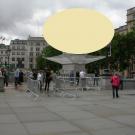


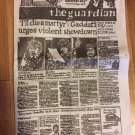






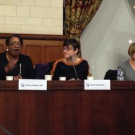








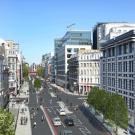


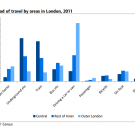

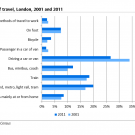




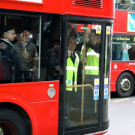








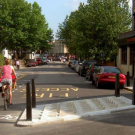




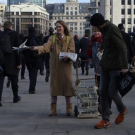
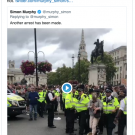















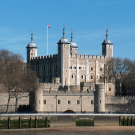














In depth interview: Writer Clare Fisher on creating a fictional map of London
What: The City in my Head, a series of short fictions by Clare Fisher set in contemporary London
When: Ongoing, with four stories published as of this interview
Where: At online fiction magazine Notes from the Underground. The stories are
- Marylebone: Q&A
- Waterloo Bridge: When I’m not talking
- Kilburn: All sorts
- Journey Planner: from wherever you are to Peckham
Snipe: You are embarking on a fictional map of London, called The City in my Head. What attracts you to this project? And what parts of the city will you be focussing on?
Clare: The project emerged when I took a step back from the stories I was scribbling and realised that they were all set in a specific area of London, and all explored the relationship between the character and the area. I asked myself just what exactly it was I was trying to do… The answer was a fictional map of the city. The idea was huge and terrifying but that attracted me to it even more.
When you’re thinking of a “London story”, are you inspired by physical places, by people, by a mood, by your own memories? How does a story start for you?
I’d say that it’s a combination of the above. It has to be a place that I have at least been to, but tends, more often, to be somewhere I know well. We are all the time making up stories about strangers as we walk around the city; I suppose that my project is a way of finding out just what it is that I make up, and what I make up will of course be influenced by my own mood and memories, etc, hence the subtitle, ‘City in my Head.’
“They must’ve been real Marylebone people, so used to eating £15 meals off slabs of wood that they could no longer taste the splinters.”
Your first story, Marylebone: Q&A, is about a couple of people who move to London from the north to find their first jobs, and how they adjust to living in the city. It will ring true with a lot of people. Why did you want to tell it?
Because although it is not my experience (I grew up in London) I know that it is, as you say, a common experience, and I thought it was worth exploring.
Is London a setting in this story, or is it an active participant? And away from the story, in life, do you think London changes people, or does it just give them a place to change themselves?
An active participant! I suppose each story asks these questions in a different way. There is such a ridiculously overwhelming variety of experience in London that I don’t think it’s possible to say that it’s one way or another for most people. I think people are changed by their environment, wherever that may be.
What’s life like at the moment for a writer trying to make a career? You’re using online magazines as a platform for your work – can you talk about the opportunities and limitations of that?
Online magazines just mean that there are more platforms where you can share your work. I don’t think there’s a hard and fast distinction between magazines that are online and those that are offline; the main thing is to choose ones that carefully sort their submissions and have a style, slant etc that suits your work. But I think that starting out as a writer and keeping going despite rejections and set-backs has always and always will be hard.
What should we expect from you next?
I’m going to be continuing with the map for the next few months at least. I’ll also be releasing a connected pamphlet with Annexe press.
Previous in-depth interviews
Actor Steffan Donnelly tells us about performing a Welsh play, in Welsh, on the London stage
Flash fiction publisher Holly Clarke explains how a 60-word story can still mean something
Helen Babbs on creating a new generation of urban nature writers
Photographer Mike Tsang on the blessing and the curse of growing up a Chinese Londoner
Kate Flowers of CoOperaCo on her mutualised operatic finishing school
Stratford filmmaker Winstan Whitter on what got lost when Dalston changed
13 Mar 2013
Today is national Alfred Hitchcock Day
Today is National Alfred Hitchcock Day. Well, according to Fangoria magazine it is.
Waltham Foresters, however, could call everyday Hitchcock day. Campaigners have been working to turn the old EMD Cinema on Hoe Street into the director’s shrine for years now.
Visitors can drink at the Alfred Hitchcock pub or stay the night, or forever, at the attached Sir Alfred Hitchcock Hotel
But knowledgeable Leytoners know that Hitchcock preferred the Drum on Lea Bridge Road and The Rose & Crown on Hoe Street.
12 Mar 2013
Hauschka - Radar (Michael Mayer Remix)
German pianist’s rich compositions get the remix treatment.
12 Mar 2013
No need to shout: How the Standard downplayed Boris's Catford calamity
Boris Johnson may still be licking his wounds after the mauling he received at a public meeting in Catford last week.
The mayor was jeered and heckled by the audience at the Broadway Theatre during the People’s Question Time event, a commitment all London mayors have to fulfil twice a year.
Unfortunately for Boris, Thursday’s venue was just a few minutes from Lewisham Hospital, whose accident and emergency unit faces being downgraded as a result of a reorganisation caused by the failure of a neighbouring NHS trust. Campaigners donned blond wigs to greet a politician who’s failed to back their cause.
Actually, other issues were discussed too, with the mayor getting short shrift on matters from police and fire cuts to his little-used cable car. But it was bad feeling over the hospital which dominated, with south-east Londoners crowbarring Lewisham Hospital into questions on housing, fire services and all other categories, to Boris’s obvious discomfort.
This was no shouting match, as the mayor was reminded of manifesto promises to defend the NHS and challenged on a claim that downgrading Lewisham’s A&E would save 100 lives.
But the night was encapsulated when local GP Brian Fisher stood up, calmly outlining that the mayor was responsible for health inequalities. Slowly and carefully, he ended: “You are ignoring that responsibility. You are a coward in that relation.”
(Thanks to Clare Griffiths, you can hear this question 1 hour, 8 minutes and 50 seconds into the audio of the meeting.)
To which Boris appeared to lose his temper, shouting that to put himself at the forefront of the Lewisham campaign would be “the act of a coward and demagogue”, to which the crowd yelled “oooooh!”
It was a rare PR disaster for a politician whose public image is very carefully cultivated. But how did Friday’s Evening Standard treat the story? Surely it couldn’t gloss over this one?
Well, it managed to bury the story at the foot of page nine, well below a big picture of a topless Justin Bieber in hospital. Implying the event was solely about Lewisham Hospital, the “coward” incident was repeated in a somewhat different manner.
“One campaigner, who introduced himself as ‘a local GP’, shouted ‘coward’ at the Mayor, who said: ‘I don’t think that to sit here all evening and repeated fusillade of abuse is the act of a coward.’”
That wasn’t what happened. Worse still, the version on the paper’s website said Dr Fisher had “only” introduced himself as a GP. One campaigner refused to let it lie. Shannon Hawthorne rang the Standard, outlined her complaints… and the newsdesk hung up on her.
She finally got a response from the paper’s managing director on Monday, who arranged for the line on the website to be belatedly amended to more closely resembling the truth. In print, though, the damage has already been done. Read more on Shannon’s blog.
It’s a small incident, and worse mistruths make it into the British press all the time. But the Standard’s treatment of his Catford calamity is a reminder of how London’s monopoly evening newspaper – owned and edited by mates of the mayor – is more concerned about endearing itself with Boris Johnson rather than actually putting itself on the side of the Londoners he represents.
12 Mar 2013
Halasan Bazar - Sometimes Happy, Sometimes Sad
Yet more excellent music from the heart of Denmark.
08 Mar 2013
How fares Boris Johnson's cycling revolution?
There’s been lots of excitement from cyclists today about Boris Johnson’s new “cycling vision” proposals.
There’s certainly some good stuff in there.
New tube-style maps for cycle routes, contactless payments for the cycle hire scheme and a segregated cycle lane on the Victoria Embankment are all sensible ideas
But I do wonder why it’s taken Boris five years to get started with any of this.
TfL first briefed the embankment cycle lane idea to journalists five years ago.
And problems with the payment mechanism for the cycle hire scheme were raised with, and dismissed by Boris before it even launched.
You also have to question his ability to actually deliver any of this.
Over the past five years we’ve had countless ‘revolutions’ promised by Boris, only for little or nothing to happen afterwards.
I remember there being similar excitement about Boris’s ‘river travel revolution.’
Four years later and the number of commuters using the Thames has actually gone down.
Today’s cycling proposals look promising, but so did his earlier ‘revolutionary’ proposals for cycle superhighways and the cycle hire scheme.
So what difference have these schemes made?
The cycle hire scheme has been a success, but TfL’s own studies show that it is used mostly by a small and wealthy group of city workers.
It hasn’t led to a wider cycling revolution in the city.
In fact in 2007, 1.75% of all ‘journey stages’ in London were made by bike.
Four years later that figure had risen to just 2%.
To be fair that’s around a 14% increase in cycling. But while that’s not bad, it’s certainly not a revolution.
In fact the rate of increase in cycling has actually gone down under Boris.
In the eight years of Ken Livingstone the percentage of journeys cycled went up by almost 50%.
If Boris carries on at his current rate he’ll be lucky to manage 40%.
Still it’s early days, and things do seem to be heading in the right direction.
Under Boris the percentage of people cycling is going up and the percentage of people using cars is going down.
But while things have improved in some parts of London, most of the city is still a pretty hostile place for cyclists.
For London to become like Amsterdam where 38% of journeys are cycled or even Munich where 14% of journeys are cycled would take a huge political and financial effort.
Does Boris have it in him? Do London boroughs?
07 Mar 2013
Number of commuters using the Thames declines under Boris
Fewer commuters are using the River Thames now than when Boris Johnson first promised a “dramatic expansion” of the service, an investigation by this blog has revealed.
In his new river action plan launched last week, the Mayor claimed that passenger journeys on the Thames had increased by 25% since he came to office.
He also claimed that there had been a continuing increase in use of the “river bus” service since he took over.
However, figures uncovered by this blog reveal that while tourist and leisure travel has risen over the past ten years, the number of commuters using the Thames has actually gone down in recent years.
TfL only subsidises the peak hour commuter service on Thames Clippers.
When Boris Johnson first unveiled his “river concordat” in 2009 there were just over two million commuter journeys on the Thames a year.
Two years ago that number dropped back below two million and has remained below that level since.
A spokesperson for TfL said today:
The River Action Plan details the actual number of passengers that use the River Bus services throughout the day whereas the Travel in London report focuses purely on peak passenger numbers. We are reviewing these reporting methods going forward to ensure they are clearer and more easy to understand.
Tourist and leisure use of the river has increased dramatically over the past ten years.
There was also a big rise in commuter journeys after Thames Clippers bought six new faster catamarans in 2007.
However, the Mayor’s ‘river concordat’ and integration of Oyster cards in 2009 have failed to increase commuter journeys at all.
Leader of the Liberal Democrat London Assembly Group Caroline Pidgeon said today:
There is a big gap in the Mayor’s rhetoric on river services and his real record so far. Having waited so long for the Mayor’s river action plan it is vital that it is fully implemented as quickly as possible. More money will be needed than the £10 million allocated. However to really ensure that proper use is made of the river there are further steps that are necessary, such as putting the river services in a very clear way on the London Underground map and ensuring that commuter boats are able to use the Westminster pier owned by Transport for London.
Boris Johnson’s own supporters have criticised his failure to fulfil his promises on river travel.
In an excoriating blog, his new cycling adviser Andrew Gilligan wrote in 2011 that “the river service is substantially worse now than before Boris came to office.”
Boris Johnson has set a new target to double river passenger by 2020, through new piers and the use of “wave and pay” technology.
How effective that will be in increasing commuter numbers could remain unclear.
TfL plan to move to an “alternative method” of counting passenger journeys starting this year.
06 Mar 2013
05 Mar 2013



















































































































Lilies on Mars feat. Franco Battiato - Oceanic Landscape
Lilies On Mars feat Franco Battiato – Oceanic Landscape from videodrome-XL on Vimeo.
Warning: Contains keyboard-related filth.
04 Mar 2013
Snipe Highlights
Some popular articles from past years
- The five spookiest abandoned London hospitals
- Could red kites be London's next big nature success story?
- Nice map of London's fruit trees shows you where to pick free food
- Only 16 commuters touch in to Emirates Air Line, figures reveal
- Hope and despair in Woolwich town centre
- Punk brewery just as sexist and homophobic as the industry they rail against
- Number of people using Thames cable car plunges
- Margaret Thatcher statue rejected by public
- The best church names in London, and where they come from
- Diary of the shy Londoner
© 2009-2025 Snipe London.
